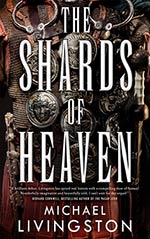
![]() Nymeria
Nymeria
3/7/2016
![]()
Historical fantasy is something an unexplored genre for me, and this book managed to pique my curiosity about it: what I found particularly interesting is the seamless blend between historical characters and facts and the story's more fantastic elements; the most fascinating aspect of this book comes from the way in which the fantasy elements do not change history - as can happen, for instance, in some steampunk or alternative history novels - but rather enhance it, making this story a very compelling one.
In the wake of Julius Caesar's assassination, the political landscape is shifting: Octavian is ruthlessly consolidating his rule as Caesar's heir, while Antony defies laws and duty by challenging him from his new home in Egypt, at Cleopatra's side. History flows along its well-known tracks, the only alteration given by the presence of the titular Shards - fragments of divine might that men can turn into weapons, changing the balance of power. While history depicts Octavian as a strong, enlightened ruler, here we see his darker side, something that does not sound so far-fetched after all, considering that records are often filtered through the victor's point of view, and if coldness and ambition are among a leader's requirements, Octavian seems to enjoy them a little too much for comfort.
But the real protagonists here are people on whom the limelight of history did never shine, like Juba II, the son of the defeated Numidian king; or Selene, Cleopatra and Antony's daughter, and her half-brother Caesarion, the offspring of Cleopatra and Julius Caesar. Chronicles indicate that Juba's father choose suicide rather than submitting to the shame of being paraded through the streets of Rome in defeat, and that his son was adopted by Caesar and became a renowned scholar. Juba, as we encounter him in this novel, is indeed an academically-inclined individual, and he's the one who first finds evidence of the Shards and of their awesome power: the difference, in the economy of this story, stands in the burning hatred and need for vengeance driving him on. This young man outwardly appears as a well-integrated citizen of Rome, the step-brother of Octavian, but in reality he chafes in his role as Octavian's useful tool, as a commodity to be exploited and kept under constant surveillance.
Selene, on the other hand, leads something of a charmed life as the daughter of the queen of Egypt, but she's hungering for more: more freedom, more knowledge, more responsibilities than those enjoyed by a young girl - even one from the ruling class - in that time and place. She possesses a very determined personality that nonetheless never slides into silly stubbornness, and in the course of events she gains depth and a maturity that go well beyond her years. Her half-brother Caesarion is somewhat less defined, but what little we see of him points to a responsible, thoughtful young man, one to whom leadership comes naturally and who is able to rule through empathy rather than brute strength. Unfortunately the latter is more suited to the times he's living in...
In this almost-choral set of characters, even the secondary ones are well-defined and worth of sympathy, starting with Dydimus, the Greek librarian burdened by guilt for his past actions, or the comrades-at-arms and friends Pullo and Vorenus, seasoned soldiers whose loyalty can bring them to extreme sacrifices. They, along with the bit players that fill this fascinating scenario, are never one-dimensional figures placed there for a specific purpose alone, but have the definite feel of real, flesh-and-blood people, adding to the wonderful depth of this immersive story.
The Shards themselves become a character as their existence and origins are slowly revealed, their presence throughout history and myth ensuring a continuity that is the true backbone of this novel: from Greek mythology, with Zeus' scepter and Poseidon's trident, to the Bible, with Moses's staff and the pieces hidden in the Ark of the Covenant, to Alexander's armor, that granted him a sort of invulnerability, these artifacts have passed through the ages leaving behind them the memory of their might, and of those who wielded them. But like all powerful objects, the Shards cannot be used by anyone, and even those specially gifted individuals are not immune from the inevitable side effects, as we see through Juba's narrative arc.
Wielding Poseidon's Trident in service to Octavian - but secretly dreaming of one day mastering it and exacting his revenge on his land's conquerors - first taxes Juba's strength, adding to the man's inner turmoil as he's forced to be an instrument of destruction in his step-brother's hands. But as time goes on and his skills improves, the Trident - and later another Shard he manages to acquire - start to transform him in a way that somehow reminded me of the corruptive powers of the One Ring: where there was only the inner conflict of a basically decent person, callousness and thirst for power take its place and threaten to transform him into what he most despises.
Only the next novel(s) in this very promising series will reveal how much these changes will affect both his personality, the course of events and the people he comes in contact with. If this first taste, with its adventurous quest after the Shards that is both epic and informative, is anything to judge the next installments by, I will welcome them with eagerness.
http://spaceandsorcery.wordpress.com